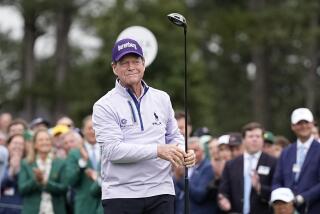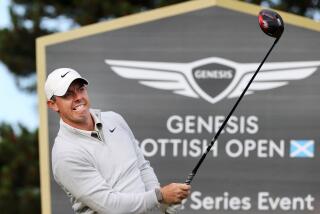Agassi Refuses to Slam Events
- Share via
The threatened boycott of the Grand Slam tennis tournaments -- the game’s four majors -- became less likely when world No. 1 Andre Agassi said Friday it would be an inappropriate course of action.
Agassi had declined comment on the contentious issue of the ATP’s “participation agreement” during Wimbledon out of respect for the event. The ATP, which runs men’s professional tennis, asked its membership to sign an agreement in which the players would participate in an alternative event, conflicting with the upcoming Grand Slam events.
“The participation agreement that was presented to the players prior to Wimbledon is inappropriate for two reasons,” Agassi said in a statement to The Times. “First, the Grand Slams are four independent organizations. The Slams act independently, should be treated independently and should not be threatened with a blanket boycott.
“Second, the game needs discussions that are designed to be productive. It does not need threats that will simply create mistrust. The ATP Tour should work with each Grand Slam independently to promote the professional game of tennis.”
But Agassi wasn’t letting the Grand Slam events off the hook, either. He has been closely following the developments, and his long-time agent, Perry Rogers, remains involved in negotiations between the ATP and officials from the U.S. Tennis Assn.
“Of course, I expect the Grand Slams to commit themselves to addressing all of the concerns of our sport,” Agassi said. “If one of the Grand Slams is not willing to engage in addressing those concerns, then I will support any action that may be necessary for the advancement of our sport.”
The idea of a possible boycott took a hit when the ATP pulled back from making such a move at the upcoming U.S. Open. Agassi isn’t the only one against the participation agreement, joining former No. 1 Lleyton Hewitt of Australia and some of the leading French players.
ATP Chief Executive Mark Miles and the members of the negotiating committee told the players in an e-mail dated July 6 that they believed the existence of the agreement has helped “move the process forward.” However, Bill Babcock, the Grand Slam Committee administrator, took issue with that characterization.
“We are unanimously certain, however, that the publicity surrounding these tactics has seriously damaged the sport and unfairly harmed the image of the professional players and tournaments while causing damage to existing and potential sponsorships,” Babcock wrote to Miles on July 8, in a letter obtained by The Times.
” ... Recruiting players on our own grounds [at Wimbledon] to sign an agreement, which, if implemented, would try to harm the Grand Slams and victimize the players has jeopardized, not improved the tenor of our discussions.”
Agassi, in a telephone interview Friday, said the burden rests on all the parties at the bargaining table.
“Everybody needs to step up and take action and accept responsibility,” he said.
For him, the players need to make a simple choice, focusing on the long-term needs and future of the sport, going beyond the front-burner issue of prize money. He hopes the tour will focus on the “sport as a whole” in its dialogue with each of the Grand Slam events.
“We have to choose whether we are going to simply focus on our own gain, or whether we are going to focus on tennis growing as a whole,” he said in his statement. “Tennis has a limited amount of resources. We do not have the multibillion-dollar TV deals that football and basketball enjoy. That means our resources must be used as efficiently as possible.
“While we might have disagreements about how those resources are spent, we must realize that the future of our sport must be considered the highest priority. We cannot simply look to create a temporary benefit for us. Rather, we must focus on the long-term needs of tennis and be willing to take any and every action that will benefit the future of our sport.”
The ATP’s hand at the bargaining table certainly won’t be strengthened with Agassi, Hewitt and others failing to sign the participation agreement. Furthermore, a messy internal matter only added to the ATP’s and Miles’ woes last week, when it surfaced that the organization’s trainers may have handed out contaminated electrolytes, leading to seven positive drug tests for the banned steroid nandrolone.
More to Read
Go beyond the scoreboard
Get the latest on L.A.'s teams in the daily Sports Report newsletter.
You may occasionally receive promotional content from the Los Angeles Times.











